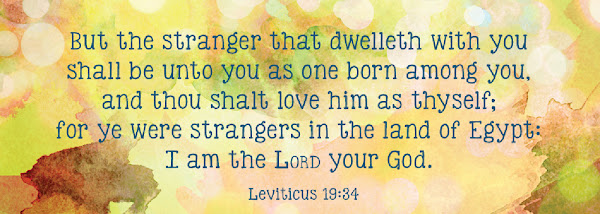of the Lord forever!
God's faithfulness is as firm as the heavens.
Psalm 89:1-2
Matthew 10:40-42
40 "Whoever welcomes you welcomes me, and whoever welcomes me welcomes the one who sent me. 41 Whoever welcomes a prophet in the name of a prophet will receive a prophet's reward; and whoever welcomes a righteous person in the name of a righteous person will receive the reward of the righteous; 42 and whoever gives even a cup of cold water to one of these little ones in the name of a disciple—truly I tell you, none of these will lose their reward."
Logically and scripturally, I'm moving beyond the lectionary text.
Hospitality
Today's reading nicely parallels and reinforces Jesus' well-known counsel to "shake the dust from your feet" and simply leave if people you offer the gospel to don't welcome you. Like Matthew 12:46-50 that I mentioned last week, it's also surprising that neither of those shows up in any lectionary year.
• Matthew 10:7-14
• Luke 9:1-5
Open hearts. Open minds. Open doors. A Welcome Table. We're very aware of God's call for us to welcome others, but this passage is something different. It's about getting out there and becoming a guest that others welcome.
"Whoever welcomes you welcomes me, and whoever welcomes me welcomes the one who sent me." Matthew 10:40
In that time and place, emissaries, envoys, ambassadors (sometimes a house-servant) represented and carried with them the full authority of the person who sent them. It was similar to our electing government officials to serve in our stead in congress, in the state legislature, in city hall. Our vote gives them authority to represent us even to the extent of speaking and acting for us. Members elect church officers to represent them on session, council, vestry, or consistory. In a similar way we represent Jesus. Jesus represents God.
Prophet, Righteous, Little Ones
• Prophets speak God's word of hope and promise for a different future; the end of the old, the beginning of the new, and call people back to the freedom of keeping the commandments. A prophet speaks for God; that includes us in our baptismal roles of prophet (speaker of God's word), priest (mediator between earth and heaven), and sovereign (caretaker of creation).
• Righteous people work for justice, integrity, and restoration of relationships. Doesn't that include us?
• Little ones are people with any kind of need; at various times that includes everyone. The late gourmet chef and Episcopal priest Robert Farrar Capon insisted God saves only the last, the lost, the little, and the least.
"Reward" here is earned wages, a payment you're entitled to, and not a gift of grace.
This Week
Matthew's gospel is concerned about fulfilling Old Testament prophecies and predictions. Matthew emphasizes Jesus as the freedom-giving New Moses whose teaching illuminates and expands on the Sinai Covenant. Welcome and hospitality are God's most essential charge.
Exodus 23:9 "You shall not oppress a stranger (foreigner, sojourner, alien), for you know the heart of a stranger, because you were strangers (aliens, sojourners) in the land of Egypt."
Leviticus 19:34 carries it a little further: "The stranger who dwells among you shall be to you as one born among you (native-born, of the same country), and you shall love them as yourself; for you were strangers in the land of Egypt: I am the Lord your God."
Last week we discussed family configurations along with Jesus' "whoever does not take up the cross and follow me is not worthy of me." Matthew 10:38
Where We Live
"And there I will meet with you, and I will speak with you from above the mercy seat..." Exodus 25:22a
Martin Luther tells us the cross of Calvary is God's Mercy Seat or Gnadenstuhl—God's throne of grace and mercy where God meets us where we are, how we are. From the Mercy Seat God rains boundless mercies and offers resurrection hope.
Today's reading is primarily about others welcoming us, though ideally welcome becomes reciprocal. Is looking to the neighbor's needs rather than insisting on our own not the way of the cross? Do we dare risk representing Jesus who represents God by putting aside our druthers to shower solace, mercy, friendship, love, and inclusion on all comers?
Neighborology—the word about the neighbor—is central to scripture. Neighborology is loving welcome in action. The scripture scholar asked Jesus, "And who is my neighbor?" and Jesus replied, "A guy was going down to Jericho..."
It's important – literally "has import" – to welcome even in small, seemingly insignificant ways, because little incidents and mini-moments add up to more than the sum of the parts as they contribute to healing and wholeness. Is there an open place at your table, on your porch or veranda, in the sandwich shop or boba spot, beside your pool?
Now that covid is waning (some), have you gotten out there to become a guest that others welcome? Who has been a neighbor to you? How have you been a neighbor? Who has shown God's mercy to you? To whom have you offered grace? What small happenings have fueled you along the way and filled others with resurrection hope?
shall be unto you as one born among you,
and though shalt love him as thyself;
for ye were strangers in the land of Egypt:
I am the Lord your God.
Leviticus 19:34






